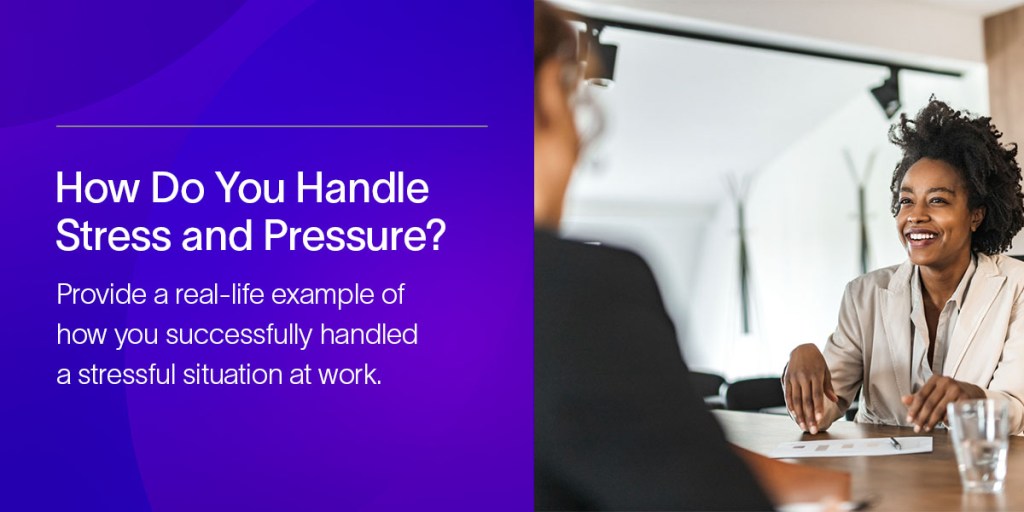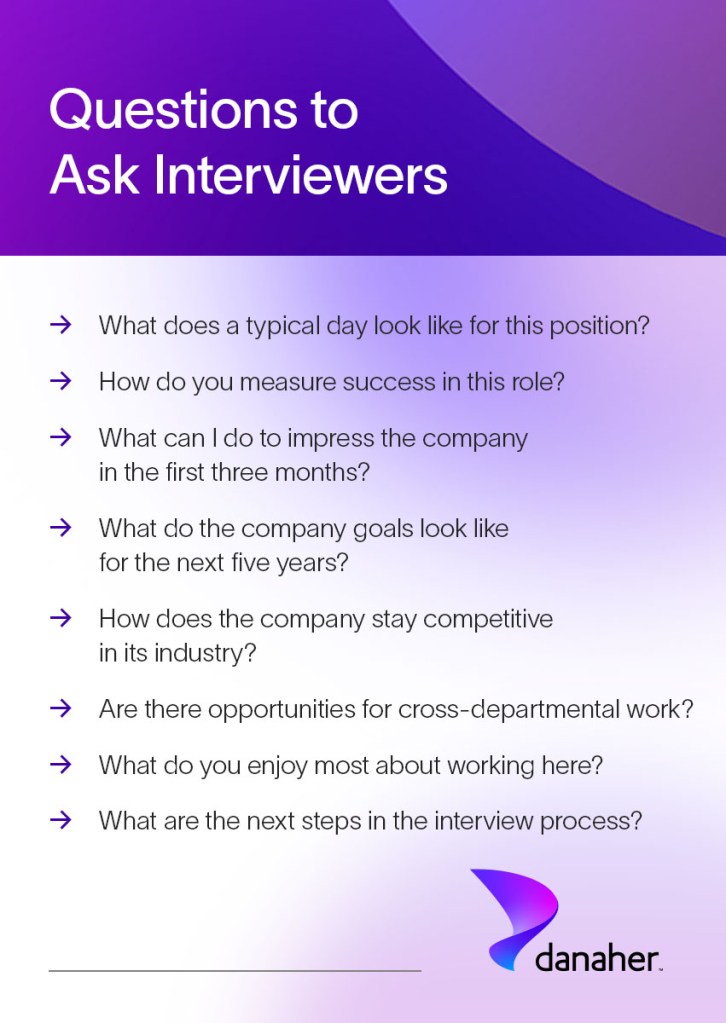Interviewing can be a challenging process — it takes preparation, poise and a positive attitude. Interviewees want to make a lasting impression and stay on top of recruiters’ minds as the ideal candidate for the position.
Most recruiters use a set of the most common interview questions, regardless of the industry or department. To make the most of each interview, candidates must know how to answer common interview questions, from “Tell me about yourself” to “What are your strengths and weaknesses?”
We’ve curated a list of the most common job interview questions, split into key categories, from interest and behavioral to leadership and communication questions. This list can help candidates prepare and know how to answer them. These answers can serve as inspiration, so feel free to personalize them.

Table of Contents
Interest Questions
With these questions, interviewers want to know more about an applicant and their interest in the specific role and company. The questions may be simple, but they can tell a lot about a person.
1. Tell Me About Yourself.
There’s a reason this question gets asked in nearly every interview. The interviewer wants to learn about the applicant and use this information to determine how well they would fit into the team. It’s a simple, open-ended question that can reveal a lot.
When planning how to answer “Tell me about yourself,” most applicants focus on their educational and career background. However, interviewees can add a personal touch by sharing their hobbies and interests outside of work.
That said, applicants should share with caution. Some information, such as one’s marital status or age, may create unintentional biases. So, try not to provide too much personal information.
2. How Did You Hear About This Job?
Employers ask this question to determine the success of their marketing efforts. Regardless of how one hears about the job opening — be it via LinkedIn or a referral from a colleague — the candidate should truthfully let the employer know.
Finding out about the job opening from an employer’s website may help one gain brownie points. Why? The business may be impressed that an interviewee took the time to explore their website directly — it signals genuine interest.
3. What Motivated You to Apply for This Role?
If an interviewer asks this question, they want to gauge the interviewee’s motives for reaching out about the opportunity. What prompted the need for change?
When answering this question, interviewees must consider the various reasons they applied. Although many people’s main reason for applying involves finances, they must try to shift their focus. Other possible reasons could include looking for new opportunities and career growth.
Applicants may even mention why they chose the employer over other competitors in the industry. The company’s website provides an excellent resource for information regarding its vision, culture and what it offers its clients.
4. What Is Your Greatest Strength?
When recruiters ask about a candidate’s strengths in a job interview, they want to gain more insight into the person. The answer can indicate an applicant’s level of self-awareness.
Candidates should be able to identify — and back up — the strengths they mention. Providing an example of one’s strength can help paint a better picture of the applicant. Although this question presents the perfect opportunity to show off one’s strengths, it requires a balance between sounding confident and not too arrogant.
5. What Is Your Greatest Weakness?
If an interviewer asks about an applicant’s strengths, they’ll also likely ask about their greatest weakness. With this question, the business wants to gauge a candidate’s self-awareness, honesty and willingness to improve.
Here is what to say as a weakness in a job interview — focus on areas of improvement. Similar to the previous question, candidates must be able to provide an example and explain how they plan to improve. Examples of weaknesses one can address include multitasking, procrastination or time management.
6. Why Is There a Gap in Your Employment History?
If applicable, the company may ask why there’s a gap in one’s employment history. Although a gap may not necessarily be bad, it makes some employers wary. They may want to know what circumstances lead to such a decision.
If the question arises, candidates should remember to be honest and brief. Whether it was a layoff, pursuing further education, personal reasons or health-related, candidates must always be prepared to answer this question.
If possible, they can fill the gap by explaining how they stayed up to date with industry news and trends or how they improved their skills applicable to the position.
7. Why Should We Hire You?
Interviewers want to know what an applicant can do for the role, team and company — what they can bring to the table. What impact can an applicant have that can potentially benefit the company as a whole?
It may seem like a daunting question, but the answer doesn’t have to be. The applicant can promote themselves with a pitch that highlights their best qualities for the job — reinforcing why a business should choose them over others. Practicing one’s pitch adds confidence to this answer, which hirers may find attractive.

Behavioral Questions
Hiring teams may ask these questions to gain insights into candidates’ personalities and behaviors in various work applications.
8. How Do You Handle Stress and Pressure?
Sometimes, work can be stressful, and employees must work hard to meet a quickly approaching deadline. How one handles themselves in these situations can provide employers with insights into whether a candidate can handle the stresses that come with a certain position.
An interviewee can highlight how they keep calm and think logically — even amid stressful situations. Candidates can provide a real-life example of how they successfully performed under a stressful situation in the workplace.

9. Would You Consider Yourself a Team Player?
In most roles, employees must be team players. Even when an employee primarily works alone, they may have to collaborate with other teams to complete a project.
If an applicant prefers to work independently, they must be careful with their answer. They can explain why they prefer this work style but should remember to highlight how they can adapt to working with others to achieve a crucial goal. During this conversation, candidates should always emphasize the value of collaboration and teamwork.
10. Describe a Time You Faced a Significant Challenge at Work.
When interviewers ask this question, they want to know how an applicant took a difficult obstacle and turned it into an opportunity. With any question that falls under this topic, it’s better to tread carefully. Always try to find a way to phrase the answer in a positive way.
An interviewee can share a personal experience from work that showcases their ability to take challenges head-on. However, candidates must keep their explanations simple without revealing too many details that could potentially paint them in a negative light.
11. Discuss a Time You Had to Work with Someone Whose Personality Was Different from Yours.
With this question, hiring teams want to know whether an applicant can interact with different personalities. This question applies to various jobs, from solo to team roles and from associates to team leaders.
Candidates can demonstrate a scenario and explain how they adjusted their approach to working with someone with a different personality or work style. They should try to be as specific as possible to showcase their self-awareness.
Culture Fit Questions
Different companies have different personalities and cultures they want to foster. Some candidates may fit well in a formal or professional culture, whereas others may not.
12. What Motivates You?
Hiring teams ask this question to ensure a candidate’s motivations align with the position and the company. Applicants should answer this question as specifically as possible and provide real-life examples. The answer should also be applicable to the job role or company’s vision and mission.
As a guide, interviewees can think about answers to the following questions:
- What does a great day at work look like, and why?
- Why did they choose this field or industry?
- What motivated them to send in an application for this position?
13. What Type of Work Environment Do You Thrive In?
With this question, interviewers want to understand a candidate’s personal preferences. Do they prefer to work remotely or at the office? Do they value workplace autonomy, or do they require a helping hand? Interviewers want to gauge whether a candidate will fit and thrive in the firm’s workplace environment.
14. Discuss a Time You Had to Deal with a Significant Change at Work.
Change is inevitable — it’s how employees and employers grow. Some respond to change better than others. If a hiring team asks this question, then they want to see an applicant’s adaptability.
To answer this, candidates should highlight their problem-solving skills and how they embrace change with confidence. They can look at this question from a different perspective — instead of seeing change as a bad thing, see it as an opportunity to grow.
Leadership Questions
Possessing leadership skills can make one stand out from the crowd. Although the role of a leader includes delegating tasks, it also involves one’s ability to inspire and help their team grow and succeed together.
15. Describe Your Leadership Style.
Whether an interviewee applied for a leadership role or not, this question may pop up. Interviewers want to comprehend a candidate’s leadership type to determine whether it aligns with the team’s needs and the company’s values.
Applicants can showcase how they handle challenges, inspire team members and carry responsibility. Additionally, discussing one’s vision, strategies and decision-making processes can help paint a picture for interviewers.
16. Describe a Time You Had to Resolve Conflict Within Your Team.
Teams consist of various people with different personalities. A hiring team may ask a candidate to discuss a time in their career when two team members had a disagreement. Hirers want to understand a candidate’s approach and how they mediate disputes, handle pressure and inspire collaboration.
When answering this question, applicants must focus on their empathy, active listening and problem-solving skills. Highlight the focus on bringing a team together to maintain cohesiveness and productivity.
17. Provide an Example of When You Had to Lead a Project with Little to No Direction.
This question can reveal how an interviewee interprets objectives, sets goals and utilizes resources. It shows interviewers how a candidate shows their problem-solving skills and resilience during a new challenge.
Candidates must show how they can adapt to these challenges and take them on with a positive growth mindset. They should specify how they felt, what they did and the project’s result.
Career Aspirations Questions
We all have goals, and hiring teams may ask potential employees about their career goals and aspirations.
18. Where Do You See Yourself in Five Years?
This question remains a favorite among hirers because many companies prefer to retain their employees rather than experience high employee turnover. After all, it takes time and resources to hire and train employees and make them feel equipped to perform at their best.
Hirers ask this question to learn about a candidate’s career goals and whether they can achieve these goals with the company. It saves time and provides insight into an applicant’s ambition.
When answering this question, candidates should try to keep it truthful and relevant to the position — and to how the position can grow. Candidates should emphasize a vision for themselves and remain confident and clear about the impact they want to make.
19. What Professional Achievements Are You Most Proud Of?
When asked this question, potential employees must keep their answers simple and to the point. Although they might feel tempted to boast about their achievements from high school to the present, interviewers may not be interested. The achievements must be relevant to the position. Hiring teams can use this information to assess one’s strengths, aspirations and fit for the firm.
Communication Skills Questions
Communication helps keep everyone informed and connected. Be it in verbal or written form — communication is a vital skill highly sought-after by numerous businesses in various industries.
20. Describe Your Communication Style.
Everyone has a unique communication style. Interviewers may ask an applicant to describe theirs to understand whether it will harmonize with the team and company.
Applicants must demonstrate how they communicate with colleagues and clients to convey a message as clearly as possible. Communicating involves listening, so candidates must showcase their active listening skills as well.
21. How Do You Deal with Miscommunication in the Workplace?
Miscommunication happens. What’s crucial is how a potential employee handles it. If asked this question, an interviewee must take the opportunity to show their ability to correct a situation with a level head and a focused mindset.
Questions to Ask Interviewers
Applicants may get the chance to ask the interviewer questions. This presents the perfect opportunity to get more details about the position and the company. Take inspiration from this list of questions:

- What does a typical day look like for this position?
- How do you measure success in this role?
- What can I do to impress the company in the first three months?
- What do the company goals look like for the next five years?
- How does the company stay competitive in its industry?
- Are there opportunities for cross-departmental work?
- What do you enjoy most about working here?
- What are the next steps in the interview process?
Remember, the interview consists of a few stages. Applicants should take the right steps before, during and after the interview to increase their chances of landing the job.
Explore Jobs at Danaher

If you’re ready to achieve your career goals in biotechnology, diagnostics or life sciences, Danaher can help. At Danaher, we don’t just prepare people for jobs — we prepare them for careers. We want to see you thrive and grow your industry knowledge and skills.
With us, you’ll make a tangible impact on people’s quality of life. Take the first steps toward a career at Danaher and explore our jobs online today.

Leave a Reply